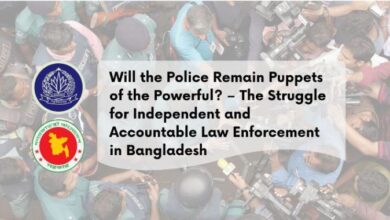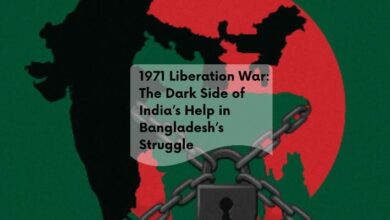BNP Faces Youth Challenges Amid Ideological Shifts in Politics
মতাদর্শিক টানাপোড়েনে রাজনীতি! বিএনপি কি তরুণ প্রজন্মের চাওয়া বুঝতে পারছে?

For the past one and a half decades, the people of Bangladesh have been yearning for fair elections, only to be repeatedly denied. But the uprising of 2024 has fused that demand with many other hopes. Whether the BNP truly understands the aspirations of the youth remains a crucial question.
In Bangladesh, there are few institutional initiatives to conduct opinion polls on political and social matters. While some companies conduct market surveys for commercial interests, they mainly serve corporate needs.
Right now, the country is undergoing major shifts in its political and social environment. If there were impartial and methodical surveys, we could grasp the nature of this change. But we lag in that culture. From personal observations, it seems that since the uprising of 2024, the influence of the BNP and student leadership has waned. In contrast, the organizational reach and public support for Jamaat-e-Islami appear to be growing.
This societal shift in Bangladesh has drawn the attention of foreign journalists and observers, who have described it as a rise in extremism. This was reflected in a recent report by The New York Times. The current transformation in Bangladesh is perhaps more social than political.
Politics in the Grip of an Urgent Ideological Tug-of-War
Major political parties and the caretaker government have rejected the facts and figures presented by The New York Times report. A large-scale survey could have clarified the truth. But in the absence of a truly democratic environment, few are brave enough to undertake social surveys. Even social scientists remain silent.
Yet, even without formal surveys, it’s evident that since mid-2024, internal rifts have deepened among the forces of the uprising. Most striking is the growing conflict between the BNP and the anti-discrimination student movement. Though this seems like a mere organizational dispute, it can be seen as a political-philosophical-ideological clash. Student leaders frequently assert that the BNP, despite being a major political party, is moving in the opposite direction of their expectations. Is this claim valid? What are its social implications?
Out of the student movement, a new political party has already been formed, and more are rumored to be emerging. They no longer act as a single force. But despite the divisions, the youth of 2024 show certain unified desires.
Today’s youth no longer wish to return to the pre-2024 version of Bangladesh. They reject the old mindset that treats bureaucrats as untouchable colonial-era rulers. Instead, they aspire to see dynamic, democratic leaders shaping the country’s future—leaders who are accountable and connected to the people.
Young citizens are calling for a shift away from the same entrenched political faces. They want honest, forward-thinking individuals in key positions such as ministers and director-generals—people who can bring fresh ideas and real solutions.
Above all, they seek greater public investment in education, health, and innovation. They demand a future with expanded job opportunities and meaningful reforms that reflect their hopes and potential. These desires became palpable eight months ago and have only intensified since.
The Dilemma: Youth Know What They Want, But Not How to Get It
The youth do not know how these goals can be achieved. They don’t believe in shedding blood to achieve them. As time passes, frustration and restlessness among the youth have grown. Exploiting this, various forces have stepped in, some even emerging as mobs. Efforts are underway to convince them that 2024 was the moral opposite of 1971.
Angry, Depressed, and Restless Youth
The values and dreams introduced by the movements of 1971 and 1990 now seem uncomfortable to many. Those long uneasy groups have seized upon the failure of 2024 to spread the idea that democratic and systematic change is impossible—they claim that even the language of change must shift.
Some youth have responded to these appeals. They still remember friends who fell on the streets. Their clothes still bear bloodstains from eight months ago. They haven’t yet fully returned to classes, campuses, or jobs.
They’ve seen state brutality firsthand. They’ve experienced suffocating authoritarian politics. Yet they feel powerless. They are angry but melancholic. Everyone talks about them, but they are not in control. Some unknowingly become pawns of vested interests. Even before they are fully formed as political agents, some are used to fracture national unity.
These very youths once dreamed of an inclusive, pluralistic society. Now they are being pitted against cultural vibrancy. They saw women break dorm gates at midnight to march in solidarity. Now they’re told that it’s more urgent to debate veils and women’s attire—that if women play sports or go to work alone, Bangladesh will fall apart.
This ideological confusion in the youth is a ‘sweet moment’ for the establishment. Bureaucrats, politically appointed professors, sycophantic intellectuals, YouTube preachers, and market syndicates are capitalizing on the failure of the uprising to restore “stability.” They wish to bring back the old Bangladesh—albeit with a softer face—prioritizing group interests over the collective will of 170 million people.
The Business-Political Nexus Wants the Old Order Back
Some business elites are fueling this return to the past. Post-‘Red July,’ they see returning to stability as essential—and they’ve made considerable progress. Money is working. Youth are being lured onto slippery paths—helicopter rides, five-star hotels, and tastes of elite lifestyles. They are being groomed into old feudal political molds.
Though there’s no election in sight, colorful posters of countless young candidates now cover the country. However, many of the youth activists from the uprising remain outside this culture. Some organizers have resumed engaging society, but even they find themselves encircled by the pull of old “stability.”
Does BNP Want a Stable Past or a Bold Future?
So the question is: does the BNP—the country’s main opposition party—also want to revert to this old version of stability? Do they have an alternative vision that addresses current youth aspirations? Is there anything more to expect from them beyond elections?
Will BNP Listen to the “57 Percent”?
It’s true—Bangladeshis have been repeatedly denied fair elections for 15 years. But the 2024 uprising added many layers of desire beyond just electoral transparency. It gave birth to a new Bangladesh—a new generation of youth.
There are about 32 million people aged 15–24 in Bangladesh. Looking more broadly, 57% of the population is under 29. Not all are voters, but they are today’s and tomorrow’s Bangladesh. This 57% is now the most crucial demographic in politics and society.
The events of 2024 have deeply transformed them. They are no longer satisfied with the old, family-dominated political environment. They are a new generation born out of unimaginable achievements. Tarique Rahman may partly understand them. His recent speeches and party directives suggest he wants to bring them in. But is his 31-point proposal enough to translate this desire into action? That’s a major question. Beyond the demand for a caretaker government, the 31 points lack clear socioeconomic commitments. Apart from promising a few commissions, there are no immediate or specific responses to the multifaceted demands of the uprising.
Even the idea of a caretaker government is tainted by Bangladesh’s past. The 31 points don’t offer much in terms of employment growth, economic reform, or controlling market mafias.
To be blunt—the moment when the 31 points were announced is very different from today. Just as December 1970 and April 1971 were radically different moments. Sometimes, four or eight months in history can propel a society further than a decade. Political parties and their advisors must recognize this shift.
BNP May Share Blame for the Rise of Extremism
The 2024 revolution didn’t happen—but revolutionary desire was born. If a revolutionary party had existed, it might have overthrown the old establishment. The establishment was lucky that didn’t happen. But ignoring this revolutionary spirit is to act as obstinately as Sheikh Hasina.
That’s where an ideological gap has emerged between the BNP and today’s urban-educated, middle-to-upper-class youth. This gap is heating up into open conflict, possibly even violence. These might be bad predictions—but the signs are there.
Tarique Rahman and his party surely don’t want to win such a conflict the way the Awami League does. But some BNP organizers and grassroots workers might. Some may try to provoke the student leadership as well. How will this danger be addressed?
As it stands, or as it’s unfolding, extremist forces are now seeing opportunities. In just eight months, they’ve made more gains than in the last eight years. While there is debate over how many seats right-wing parties will win in elections, few doubt their vote share will rise. But more important than votes is their new social dominance. But was a theological state ever the goal of the 2024 uprising? If not, then who will stop the political conflict from shifting rapidly from a center-left to a center-right polarization?
July’s Core Issue Was Inequality, Not Theocracy
The fundamental issue of “Red July” was inequality. The goal was an inclusive society. But as July 2024 fades into July 2025, we are seeing increasing contempt for 1971, denial of December 16, erasure of Liberation War history, veiling of war memorials, threats of execution against dissenters. Even uprising-aligned intellectuals like Salimullah Khan and Farhad Mazhar are facing such threats.
In July, women were a central force on the ground. For 50 years, working women have held up Bangladesh. But now, an agenda is rising to marginalize them socially.
So the final question: will the BNP and its leadership allow 2024’s legacy to be distorted like this? What’s stopping them from updating their 31 points to reflect the youth’s aspirations? Politics is supposed to serve the people. So what’s wrong with BNP opening dialogue with the 57%?
If the leading party of 1972–73 failed to reform the state structure along the aspirations of the Liberation War, and reconstruct society, then if the leading party of 2025 fails to reshape itself in line with the aspirations of 2024—it will lead to catastrophic consequences. Even without being in power, the BNP will bear that historical responsibility.
Bangladesh needs elections soon. But the youth also feel many other things are needed just as urgently. This is not a zero-sum game. Some third parties are trying to frame it that way. But for the forces of the uprising to succeed, they must all win—otherwise, in the end, the right wing will win. Bangladesh will lose.
And as the New York Times hinted, denial won’t work much longer.




